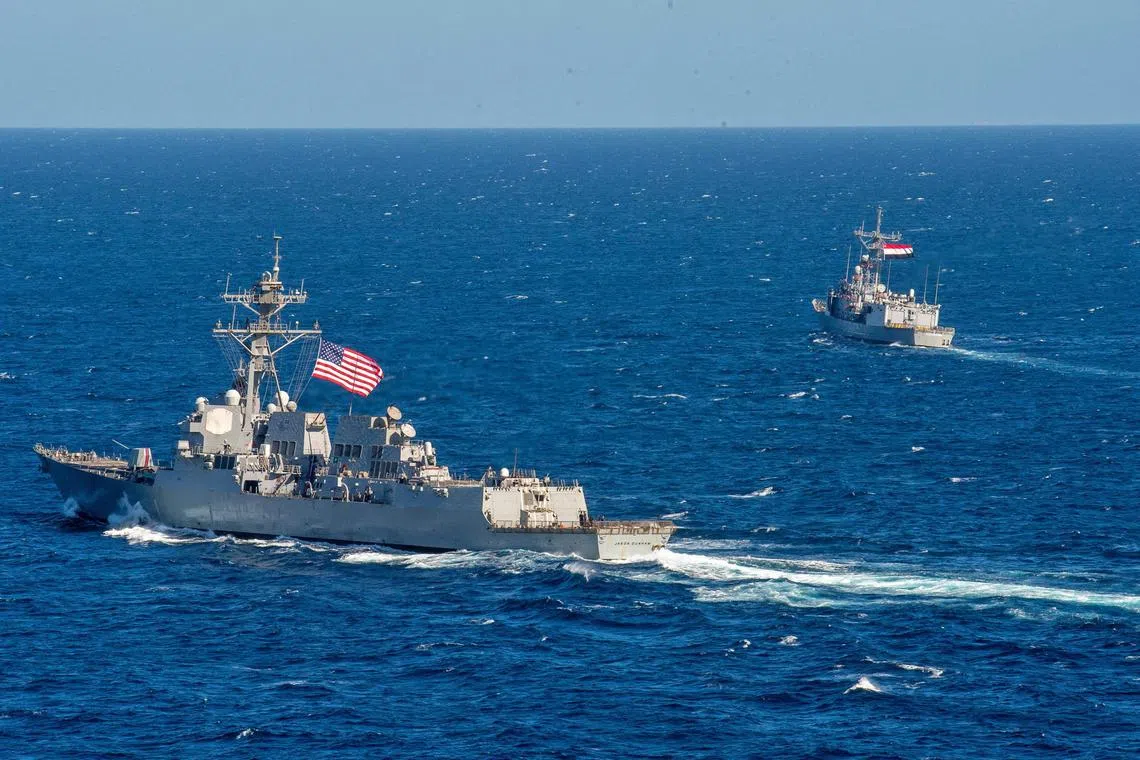Pentagon says Venezuelan planes buzzed US ship in ‘highly provocative move’
Sign up now: Get ST's newsletters delivered to your inbox

A file photo from 2022 showing US Navy guided-missile destroyer Jason Dunham (left) and an Egyptian Navy frigate conducting exercises in the Red Sea.
PHOTO: AFP
Follow topic:
WASHINGTON – Two Venezuelan military planes flew near a US Navy vessel in international waters on Sept 4, the Pentagon said, calling it a “highly provocative move” and warning Caracas against further escalation.
“The cartel running Venezuela is strongly advised not to pursue any further effort to obstruct, deter or interfere with counter-narcotics and counter-terror operations carried out by the US military,” the Pentagon said on social media platform X.
It called the action a “highly provocative move” that it said “was designed to interfere with our counter-narco-terror operations”.
The US military killed 11 people
Legal experts have raised questions about the attack.
The New York Times reported, citing a US defence official, that two Venezuelan F-16 fighter jets flew over the US Navy guided-missile destroyer Jason Dunham in the southern Caribbean Sea.
The US warship did not engage, the official was cited as saying by the newspaper.
The Sept 2 attack marked a departure in the use of the military.
Mr Trump said in a social media post that the boat was transporting illegal narcotics, which would normally be the responsibility of the US Coast Guard to intercept.
If the coast guard had been fired upon when trying to stop the boat, the coast guard members would be justified in defending themselves, legal experts said.
However, Mr Trump posted a video on social media that appeared to show a speeding boat being destroyed by an air strike.
The administration did not provide any evidence that the United States was under imminent threat of attack, or that the vessel was armed, and did not identify targets on the boat who were critical to an extremist attack, as past presidents have done in similar attacks.
In the eyes of many people around the world, those on the boat were civilians and the attack will be seen as an extrajudicial killing, said the legal experts.
US Secretary of State Marco Rubio, during a trip to Latin America, defended the new aggressive approach in a joint press conference with Ecuador Foreign Minister Gabriela Sommerfeld in Quito on Sept 4.
“Now, they (Latin American states with known drug cartels) are going to help us find these people and blow them up if that’s what it takes,” Mr Rubio said.
In remarks made in Mexico
Venezuelan leader Nicolas Maduro has responded by mobilising Venezuela’s military, which numbers around 340,000, and reservists, which he claims exceed eight million, denouncing what he calls “the greatest threat our continent has seen in the last 100 years”.
“If Venezuela were attacked, it would immediately enter a period of armed struggle,” he said. AFP, REUTERS

